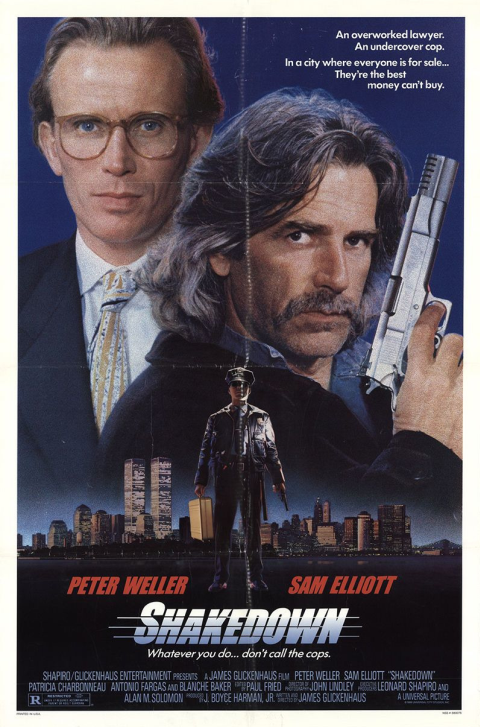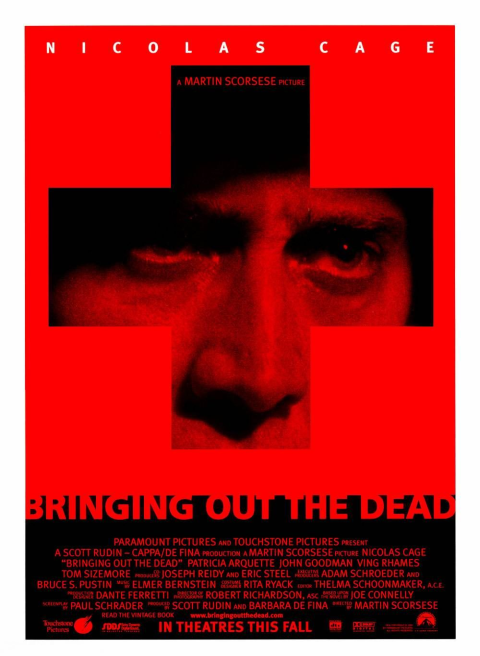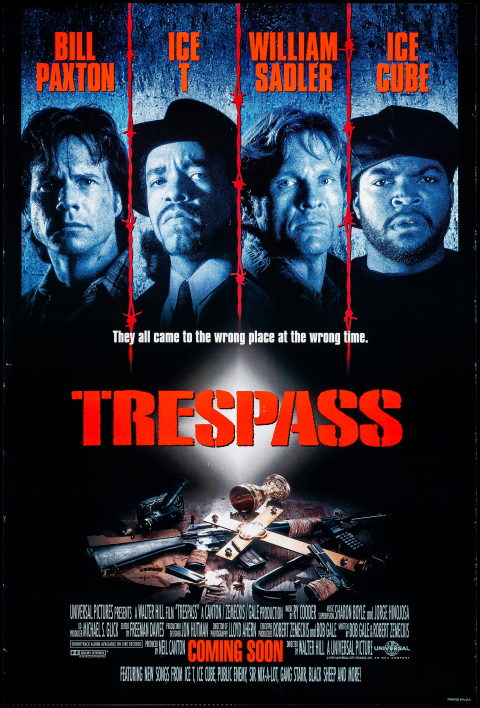Full disclosure: I have not seen these three movies in theaters recently, but, per my own review principles, I have seen them theatrically at some point in the past few years (and all on 35mm film to boot). Anyway, since I’m basically still in corona-lockdown and theatrical viewings are at a premium, and since I’m back writing again, I thought it would be fun to do a “seafood stew” and put together a sort of First Responder triple pack (with more than a little wink as I say that). Enjoy.

Written and Directed by James Glickenhaus
Cast: Peter Weller, Sam Elliott, Patricia Charbonneau, Jude Ciccolella, Blanche Baker, Antonio Fargas, Richard Brooks, John C. McGinley, Henry Judd Baker, Larry Joshua, Vondie Curtis-Hall, William Prince, Anthony Crivello, Thomas G. Waites, Paul Bartel, Holt McCallany, Walter Flanagan
Soundtrack: Jonathan Elias
Of the numerous films I’ve been introduced to at Alamo Drafthouse Yonkers over the years (I pray it re-opens at some point, any point), Shakedown by far left me with the biggest smile on my face.
Now, I know movies involving police are a tough sell right now, but hear me out, because this one actually cares about true justice.
I suppose Shakedown would qualify as a buddy cop film, it’s a somewhat debatable point, but it’s not one with two cops together (e.g. Lethal Weapon, Running Scared, etc.); it’s one of those with an odder pairing (e.g. 48 Hrs., Die Hard with a Vengeance, etc.). In fact, the protagonist of this story is actually a legal aid attorney, which bears out my notion that the heart of the movie is real justice. Sure, there’s some reel justice, too, as expected, but that’s a parallel strength of the movie (I’ll just say: Coney Island, whoa).
The only genuine weaknesses I’d say the movie has are, for one, a slight failing of budget at the very end, and there’s one scene in particular that just seems out of step with the rest of the film (it might’ve been okay as a dream sequence or something like that), but make no mistake, this is James Glickenhaus’s magnum opus. Earlier works like The Exterminator and The Soldier certainly have their entertainment value, but as far as I know nothing else he’s made is as tightly written as Shakedown, and the more times I watch it the more the quality becomes evident.
Anyway, I don’t know if Shakedown is the very last action film to shut down 42nd Street for major stunt sequences, but if it is, what a way to go out. Even more than “The Deuce” though, the movie is a treasure trove of a time capsule for pre-Giuliani New York, including the condemned West Side Elevated Highway (before it was finally torn down, obviously). Certainly a far cry from the Disneyfied city we see today.
Of course, what is a buddy cop movie without its buddies, and boy are these two a pair. Sam Elliot is just as you’d expect him, in the best way possible, but it’s still Peter Weller’s universe. In fact, I’ll go as far to say that Shakedown is PEAK Peter Weller; beyond RoboCop, and even beyond, dare I say, Buckaroo Banzai (much as I do love both those films). However, it would be unfair to not mention Patricia Charbonneau, as she turns in a strong supporting performance.
In the end though, what makes me love Shakedown is that it’s not just another buddy cop film, because it makes you think a little bit in addition to the thrills and chills. It may not be the best but it’s got a ton of personality and unique quirks, and with a budget somewhere under $10 million it punches far above its weight class. It’s under-seen and underrated and it deserves much more notoriety, especially compared to some other 80s “classics”.
Rating: ★★★★☆

Directed by Martin Scorsese
Written by Paul Schrader, based on the novel by Joe Connelly
Cast: Nicolas Cage, Patricia Arquette, John Goodman, Ving Rhames, Tom Sizemore, Marc Anthony, Mary Beth Hurt, Cliff Curtis, Nestor Serrano, Aida Turturro, Sonja Sohn, Afemo Omilami, Judy Reyes, Cullen O. Johnson, Arthur J. Nascarella, Larry Fessenden, Michael Kenneth Williams, Queen Latifah
Soundtrack: Elmer Bernstein
Now, I know what you’re thinking.
“A New York City film written by Paul Schrader, directed by Martin Scorsese, and it’s not Taxi Driver?”
Correct.
Unfortunately for poor Marty, Bringing Out the Dead was a box office bomb, which is probably why it’s never gotten a proper, loving home format release, even though it’s a film begging for a 4K Blu-ray restoration (though apparently this and Sleepy Hollow were the last films released on LaserDisc, so, that’s interesting). Frankly, it’s a shame that this movie is relegated to “hidden gem” status, because I think it’s among Scorsese’s better films; certainly better than most things he’s directed since (yeah, I’m looking at you, The Irishman).
The plot, is, well… I’d describe the whole movie as something of a fever dream. Nic Cage plays a paramedic who’s in a bad way. He’s insomnious to the point of hallucination, he’s on a cold streak of saving people, and it’s a bit of a Russian Roulette situation with who he’s paired up with on a given night. In the midst of this seemingly comes a ray of hope, when he appears to have saved a man’s life, and maybe strikes up a bit of a thing with his daughter, played by Patricia Arquette.
Though the movie was made in the late Nineties, it’s set in the drug-addled days of pre-Giuliani NYC, and the film is not afraid to comment on a number of serious issues.
What really makes it for me though is the cast and the music. Though it’s heavy at times, just about everybody seems to be reveling in their performances, and that comes through the screen; and the soundtrack (both the wonderful Elmer Bernstein score and the licensed songs) just amplifies it all.
Off the beaten path, but well worth it.
Rating: ★★★★☆

Directed by Walter Hill
Written by Bob Gale & Robert Zemeckis
Cast: Bill Paxton, Ice-T, William Sadler, Ice Cube, Art Evans, De’voreaux White, Bruce A. Young, Glenn Plummer, Stoney Jackson, T.E. Russell, Tommy ‘Tiny’ Lister, John Toles-Bey, Byron Minns, Tico Wells, Hal Landon Jr., James Pickens Jr., L. Warren Young
Soundtrack: Ry Cooder
Oh, you thought were we done with the heavy hitters?
Think again.
That’s right, from the creators of Back to the Future and the director of 48 Hrs. comes a tale of treasure sought, and all the pitfalls that come with it.
Now, admittedly, Trespass is the most tenuously connected film in my First Responder trilogy here, as our nominal protagonists are indeed fire fighters, but outside of one introductory scene there’s no real firefighting to be found; but, hey, this is my seafood stew.
Trespass is one of those movies that’s limited in scope, scale, and cast, but manages to be just as captivating as many a bigger film.
While fighting a fire in Fort Smith, Arkansas, our two nominal protagonists (played by Paxton and Sadler) are gifted a map to treasure in a now abandoned factory in East Saint Louis, Illinois. Unfortunately for them, the day they go to investigate happens to be the same day that a local gang (led by Ice-T and Ice Cube) happens to be executing someone on the same grounds.
You can imagine where it goes from there. Lots of tension, intrigue, criss-crosses; in fact, now that I think about it, it kind of reminds me of Green Room, except Trespass takes place in the daylight, which makes it feel more hopeless at times, though I wouldn’t say Trespass borders on horror territory like Green Room does.
In the end, it’s a nice, tight, entertaining little thriller. Not the best, but unique and different.
Rating: ★★★½ (out of five)



